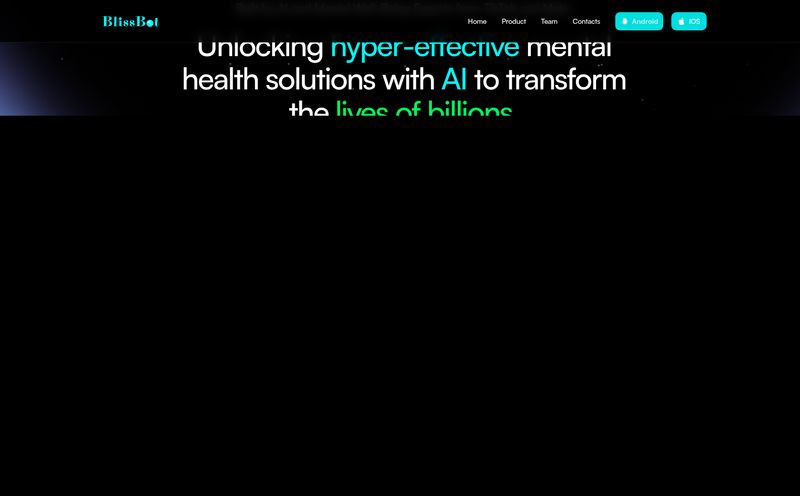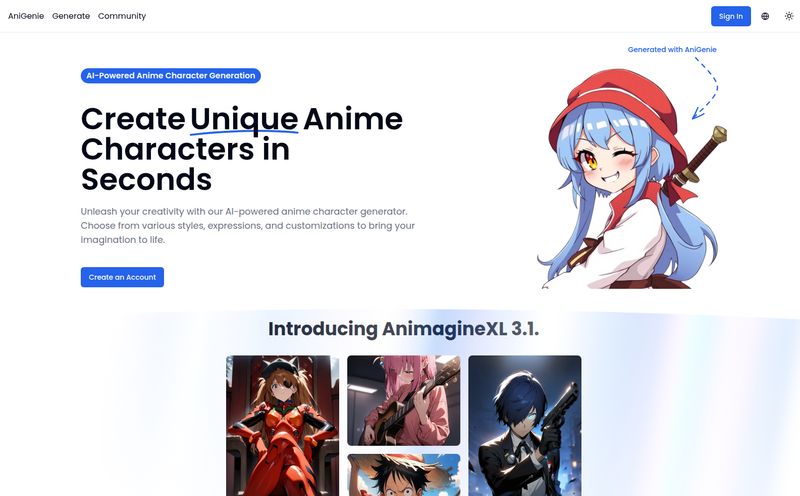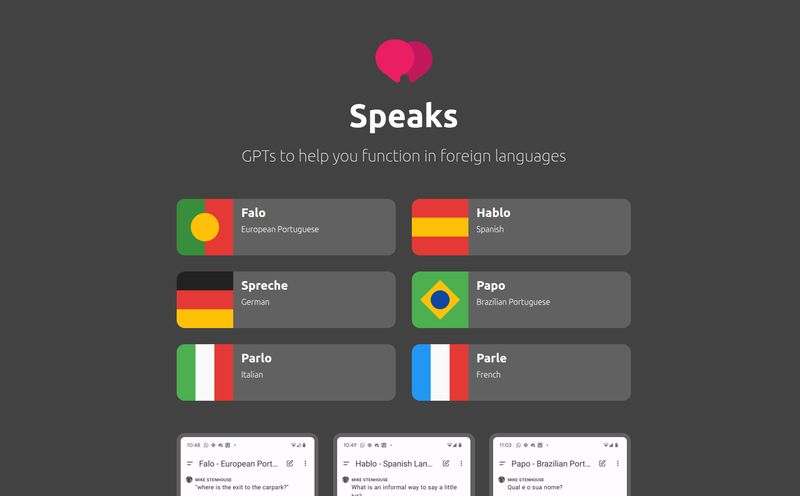We’ve all been there. You've sunk hours into Duolingo, your flashcard app is practically smoking from overuse, and you can conjugate a verb into the pluperfect subjunctive in your sleep. You’ve got the knowledge. But then, the moment of truth arrives. A native speaker asks you for the time, and your brain just… freezes. Crickets. All that hard-won vocabulary vanishes, replaced by a jumble of panic and the word “uhhh.”
It's the great wall of language learning. The gap between knowing a language and speaking it. For years, the only way to break through was to find a patient (and often expensive) tutor or throw yourself into the deep end with native speakers, praying you don't make a complete fool of yourself. But what if there was another way? A way to practice those real-life conversations without the pressure, the judgment, or the scheduling headaches?
Well, I recently stumbled across a new tool that claims to be just that. It's called PolySensei, and the concept is so intriguing I had to take a closer look.
So, What is PolySensei, Anyway?
At its heart, PolySensei is an AI-powered avatar conversation app. Think of it less like a textbook and more like a video game's non-player character (NPC) designed to help you order a coffee in Tokyo instead of sending you on a quest for a mythical sword. The idea is to have interactive, surprisingly lifelike conversations with an AI avatar to build your speaking skills in a private, judgment-free zone.
It’s a bold promise. We've seen language chatbots before, of course, but PolySensei seems to be aiming for something more dynamic. Not just canned responses, but a genuine back-and-forth that mimics the unpredictability of a real chat.

Visit PolySensei
The Core Features That Caught My Eye
Scouring the info I could find, a few things really stood out. This isn't just another flashcard app with a voice feature. The design seems built from the ground up to tackle the speaking problem head-on.
Your Personal AI Conversation Buddy
The main event is the AI avatar. You get to talk to it, and it talks back. This is crucial. According to a lot of linguistic theory, like Stephen Krashen’s famous “Affective Filter Hypothesis,” a learner's anxiety can literally block their ability to acquire language. An AI has no ego, no impatience, it won't ever sigh because you used the wrong gender for 'table'. It's the ultimate patient partner.
Crafting Your Own Scenarios
This is the part that gets me really excited. PolySensei says you can create customizable learning scenarios. This is a game-changer. Instead of just learning generic phrases, you can build the exact conversation you're nervous about. Got a job interview in German coming up? You can practice that. Need to explain a food allergy in Italian? Set up the scenario. This takes it from a theoretical exercise to a practical rehearsal for real life. It’s the difference between reading a book about swimming and actually getting in the pool.
Instant Feedback Without the Awkwardness
The app also promises real-time responses and feedback. Getting immediate correction is one of the fastest ways to improve, but let's be honest, it can sting a little when it comes from a person. Getting that same feedback from an app feels different. It’s just data. It removes the emotional baggage and lets you focus purely on improvement. Did I say that right? Was my pronunciation off? Getting an instant, neutral answer is an incredible learning loop.
The Good, The Bad, and The AI
Okay, let's get into the nitty-gritty. No tool is perfect, and my years in SEO and tech have taught me to have a healthy dose of skepticism. Here’s my breakdown of what looks promising and where I’m reserving judgment.
The Upside (What I'm Excited About)
The potential here is huge. For language learners, this could be an amazing supplement to other methods. The ability to practice speaking on your own schedule, without needing to coordinate with a tutor across time zones, is a massive win for busy people. The interactive nature is also far more engaging than just reading or listening. You’re an active participant. I've always felt that active recall is the key to memory, and a conversation is the ultimate form of active recall.
Potential Sticking Points (Let's Be Real)
Now for the reality check. The biggest question mark hangs over the AI itself. The tool's entire value rests on the quality of its AI. If the conversations are clunky, unnatural, or repetitive, the whole thing falls apart. Will it understand slang? Can it pick up on subtle cues? I'm not so sure. Replicating the true nuance of human conversation—the pauses, the humor, the cultural subtext—is incredibly difficult.
Another thing is the lack of clarity on supported languages. “Multiple language support” is great, but does that mean a half-dozen major languages, or a truly impressive library? The devil, as they say, is in the details.
The Hunt for PolySensei: A Little SEO Detective Work
Full disclosure, when I went to dig deeper to find a pricing page or a live demo for you all, I hit a bit of a wall. The website, at the time of writing, was showing a 'page not found' error. Now, in the world of online marketing, that can mean a few things. It could be a temporary glitch, sure. Or, and this is my hunch, it could mean that PolySensei is a very new product, maybe in a closed beta or gearing up for a big launch. It's like finding a trailer for a movie that doesn't have a release date yet. It builds the anticipation. There's no public pricing available either, which supports this 'stealth mode' theory.
So while I can't give you a hands-on review just yet, the concept alone is worth talking about. It feels like we're on the cusp of some really interesting developments in AI-driven education.
Who Is PolySensei Actually For?
Assuming the AI is as good as promised, I see a few groups of people who would benefit immensely from a tool like this:
- The Intermediate Learner: This is the sweet spot. You know the rules, but you need the reps. You need to get those words out of your head and into the air.
- The Shy Speaker: If the thought of speaking to a native makes you break out in a cold sweat, this is your safe space. Build your confidence here before you take it to the real world.
- The Busy Professional: Can’t fit a 1-hour session with an iTalki tutor into your schedule? You can probably squeeze in a 10-minute AI chat while your coffee brews.
This won’t replace a real human tutor who can explain complex cultural context, but it's not trying to. It’s a tool for a different job. It's the batting cage you use to perfect your swing before the big game.
My Final Verdict (For Now)
So, is PolySensei the future of language learning? It's too early to say for sure, but I am cautiously optimistic. The concept is fantastic. It directly addresses the biggest bottleneck for so many students: a lack of low-stakes speaking practice.
If the team behind PolySensei can nail the execution and create an AI that is genuinely responsive and intelligent, this could become an indespensable tool in every serious language learner's toolkit. I’m definitely keeping this one on my radar and will be first in line to try it when it launches. It represents a shift from passive learning to active practice, and that’s a trend I can absolutely get behind.
Frequently Asked Questions
- What is PolySensei?
- PolySensei is an AI-powered application designed to help people practice speaking new languages. It uses AI avatars to create interactive, simulated conversations in a variety of customizable scenarios.
- How does PolySensei help with language learning?
- It primarily helps by providing a safe, on-demand environment to practice speaking. This helps build confidence, improve pronunciation, and increase conversational fluency without the fear of making mistakes in front of a real person.
- Is PolySensei free to use?
- As of now, pricing information for PolySensei is not publicly available. This could mean the tool is in an early development or beta testing phase. We'll have to wait for its official launch to know about its pricing model.
- What languages does PolySensei support?
- The creators have mentioned 'multiple language support,' but a specific list has not been released yet. This information will likely become available closer to or during its official launch.
- Can PolySensei replace a human language tutor?
- In my professional opinion, no. It's better to think of PolySensei as a powerful supplement. It's like a gym for your language skills—great for daily practice and building muscle. A human tutor is more like a personal trainer who can offer deeper cultural insights, personalized lesson plans, and real human connection.
Conclusion
The journey of learning a new language is a marathon, not a sprint, and every good runner needs the right gear. Tools like PolySensei represent a new and exciting piece of that gear. While the jury is still out on its real-world performance, the premise alone is a massive step in the right direction. It promises to make speaking practice more accessible, less intimidating, and maybe even a little more fun. And in the long, often frustrating process of learning a new language, that's something to be genuinely excited about.
Reference and Sources
- Krashen, S. D. (1982). Principles and Practice in Second Language Acquisition. Pergamon Press. (For more on the Affective Filter Hypothesis).
- iTalki - An online platform for connecting with human language tutors.



